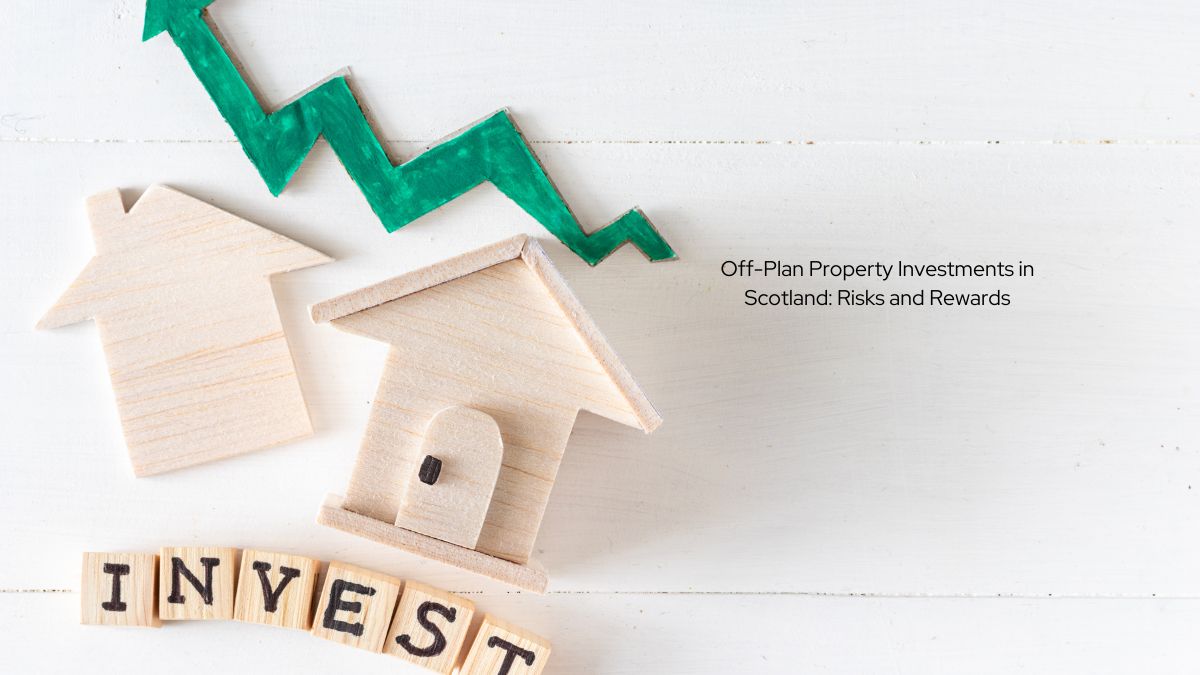Off-Plan Property Investments in Scotland: Risks and Rewards

Buying a home before it’s built is called an off-plan property purchase. You pay lower than the final price. Lately, more people in Scotland are looking into this. Why? Off-plan comes with risks and rewards. This blog breaks those down.
Scotland has many unfinished developments. The housing market grows, too. So builders offer deals to buyers. Put down a deposit early, and you beat rising rates. But there’s the catch. The home may never get completed or miss deadlines by months or years. Other things can also go wrong, and still, off-plan buys have upsides.
Aside from better prices, you might customise fittings and layouts. Newer properties also require less maintenance and this allows hands-off investing if you rent them out.
So, is off-plan worth the hassle for Scots? Discover the main risks purchasers face and see how to maximise returns. Learn which projects make good financial sense.
Understanding Off-Plan Investments
Off-plan means buying a home before construction finishes. First, you reserve with a deposit. This holds the price. It also lets custom picks like kitchens.
Builders break ground using deposits to fund projects. You pay instalments as work progresses. When ready, you settle any balance. Then receive keys to your completed property.
Scotland draws off-plan interest nowadays due to:
- Economic growth and investment
- Housing shortages
- Many new developments
The economy keeps strengthening after Brexit risks. Scotland also attracts more outside investors. Those see potential in both residential and commercial properties. Together, this spurs a wave of new construction projects. These aim at housing shortfalls in major cities.
Edinburgh alone expects thousands of new homes and flats. Glasgow and Aberdeen also address serious shortages. Even scenic rural and coastal areas build up.
This expansion means abundant off-plan opportunities exist. Getting in early locks at lower rates.
Below are key factors making Scotland an off-plan hotspot:
- Tourism and immigration growth
- Ongoing urban regeneration
- Student housing demands
Rising tourism, especially post-pandemic, fuels housing needs. Scotland’s beautiful landscapes and rich culture draw visitors. Immigration also brings more residents. So both global interest and expanding local economies drive up long-term rental demand.
Urban planning further transforms Scotland’s biggest cities. Glasgow, Edinburgh and Dundee pour billions into modern developments.
Student enrollments simultaneously break records year after year. Universities scramble trying to meet accommodation requirements.
The Rewards of Off-Plan Investments in Scotland
Buying off-plan means lower rates for buyers. Putting down deposits before construction locks in today’s values. Since Scottish housing prices rise nearly 5% annually, early reservations capture savings. Investors gain equity as the building progresses towards completion in 1-3 years.
Capital Appreciation
The longer the project timeline, the more value is boosted by completion. Newer builds also sell faster when ready, for higher profits. Quality finishes help. So, are favourable market conditions expected in the next few years? Scotland’s major cities see rapid growth right now. However, the surrounding commuter areas with new constructions also appreciated it quickly.
Customization Potential
Most off-plan contracts allow interior customization. Investors can tailor layouts and select luxury fittings for rentability or resale. Smart home tech additions modernise. Premium kitchens and baths also enable higher rents and tighter sales. Such personalization renders unique properties that help them stand out.
Stamp Duty Savings
Bridging loans in Scotland help buyers finance pre-construction deals. These bridge funds until the property sells or starts generating rental income. Additionally, off-plan homes qualify for lower stamp duty under certain conditions. This provides another edge to investors during pre-builds.
Key opportunities include:
- More space or rooms
- Energy upgrades
- Rental furnishings
- Private parking
Loans help buy off-plan without large savings. Interested people can get bridging loans in Scotland. These provide enough money to cover deposits and fees upfront. Investors repay once their property sells or rents out later.
So loans bridge the gap, allowing builds even when your funds fall short. This opens opportunities that cash buyers miss. Just make sure to choose experienced lenders familiar with construction loans.
Since off-plan locks in tomorrow’s property at today’s rates, investors gain from price hikes over construction. Giving purchasers customization powers further boosts value. Add strong appreciation even for surrounding regions, and off-plan rewards start stacking up.
Get to know about Baroda Tabit and how it works.
The Risks Associated with Off-Plan Investments
Housing markets change a lot in a few years. By the time your home is built, prices may drop below what you paid. This risk means possibly losing money when you sell.
Rents can also fall if the area gets overbuilt. Then your returns from leasing suffer. It helps by checking multiple forecasts to gauge where things could go. But there are no guarantees.
Development Delays
Build delays often happen with new constructions. Projects hit snags like material shortages, labour issues, and bad weather. Some even stop entirely if builders go bankrupt.
The problem for buyers? You keep paying longer for hotels, storage, and rental housing. Plus, there is the loss of expected rental income once moved in. In the worst case, you lose the entire investment with no finished property to show.
Financial Commitments
Booking off-plan means large upfront deposits. This puts your money at risk if developments fail. Finding mortgages later can also prove difficult until buildings are inhabitable. Not all lenders approve unfinished properties.
So total costs may fall on you until complete. That demands big reserves few investors have. Going rental-only without selling risks insufficient income to cover overruns.
In fast-changing markets, off-plan goes quickly from profit to liability. But for savvy buyers, risks often earn rewards when carefully managed.
Financing Off-Plan Investments
Many types of loans are available, but one loan is the most popular! Bridging loans in Scotland help buyers cover deposits to reserve properties. Most ask 10-30% down when signing. Finding so much cash is difficult for many. Loans bridge this gap, providing funds you later repay after renting out or selling once built.
The challenge? Not all lenders finance unfinished builds. They often want a minimum of 20-30% equity, so they work solely with experienced construction loan brokers. They structure terms well, given the risks.
Conclusion
Off-plan buys can earn nice profits if done right. Lower pricing and customisation rewards patient buyers. But market swings and building delays always risk losses, too. Wise investors research their options extensively first.
Seek professional guidance on valuations and financing. Ensure projects meet your goals and abilities before signing. Off-plan works best for those able to withstand unpredictable setbacks. But for skilled buyers, risk brings significant potential in Scotland’s growing housing market.




